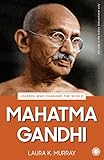Mahatma Gandhi
Material type: TextPublication details: Mumbai Jaico Publishing House 2022Description: 92 pISBN:
TextPublication details: Mumbai Jaico Publishing House 2022Description: 92 pISBN: - 9789390166619
- GN 320.55 MUR
| Item type | Current library | Call number | Status | Date due | Barcode | Item holds |
|---|---|---|---|---|---|---|
|
|
Gandhi Smriti Library | GN 320.55 MUR (Browse shelf(Opens below)) | Available | 179549 |
LEADERS WHO CHANGED THE WORLD
In 1948, the year that Mahatma Gandhi was assassinated, the Nobel Peace Prize was not awarded to anyone as they found no “suitable living candidate”. It is believed that he would have received the prize that year.
Beginning his career as a shy lawyer, Gandhi’s deep belief in justice helped him develop his philosophies about truth, tolerance, and nonviolence. He garnered supporters who wanted to follow his example of living simply, empowering others, and striving to unify all peoples.
Critics questioned his commitment to universal pacifism. Some even criticized him for focusing on initiatives besides India’s independence such as his involvement with the untouchables or his refusal to call for the elimination of India’s caste system altogether. Others held negative views of his political leadership and his perceived dedication to Indian nationalism over universal peace.
Yet, even today, Gandhi’s critics admit their admiration of his steadfast commitment to nonviolence. Read all about the remarkable journey of the flagbearer of nonviolent protests who was instrumental in India’s fight for independence.


There are no comments on this title.